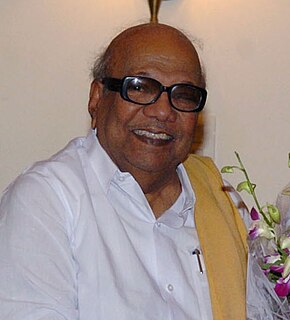
Dravida Munnetra Kazhagam, (DMK); is a political party in India, particularly in the state of Tamil Nadu and Union Territory of Puducherry. It is currently the Opposition party in Tamil Nadu and is part of the Indian political front the United Progressive Alliance (UPA).

Muthuvel Karunanidhi was an Indian writer and politician who served as Chief Minister of Tamil Nadu for almost two decades over five terms between 1969 and 2011. He had the longest tenure as Chief Minister of Tamil Nadu with 6,863 days in office. He was also a long-standing leader of the Dravidian movement and ten-time president of the Dravida Munnetra Kazhagam political party. Before entering politics, he worked in the Tamil film industry as a screenwriter. He also made contributions to Tamil literature, having written stories, plays, novels, and a multiple-volume memoir. He was popularly referred to as "Kalaignar" (Artist) and "Mutthamizharignar" for his contributions to Tamil literature.

Muthuvel Karunanidhi Stalin is an Indian politician from Tamil Nadu and Leader of opposition in the Tamil Nadu Legislative Assembly from 25 May 2016. He is the son of the former Chief Minister of Tamil Nadu, M. Karunanidhi.

Nagercoil Sudalaimuthu Krishnan, popularly known as Kalaivanar and also as NSK was an Indian film actor-comedian, theatre artist, playback singer and writer in the early stages of the Tamil film industry – in the 1940s and 1950s. He is considered as the "Charlie Chaplin of India."

Internet censorship in India is done by both central and state governments. DNS filtering and educating service users in suggested usages is an active strategy and government policy to regulate and block access to Internet content on a large scale. Also measures for removing content at the request of content creators through court orders have become more common in recent years. Initiating a mass surveillance government project like Golden Shield Project is also an alternative discussed over the years by government bodies.

Rickshawkaran is a 1971 Indian Tamil-language vigilante film directed by M. Krishnan Nair and produced by R. M. Veerappan, who doubled as screenwriter. The film stars M. G. Ramachandran, Padmini and Manjula. It revolves around Selvam, a rickshaw puller who witnesses the murder of another rickshaw puller, and decides to unearth the mystery behind this murder.

Tamil Nadu Legislative Council was the upper house of the former bicameral legislature of the Indian state of Tamil Nadu. It began its existence as Madras Legislative Council, the first provincial legislature for Madras Presidency. It was initially created as an advisory body in 1861, by the British colonial government. It was established by the first Indian Council Act of 1861, enacted in the British parliament in the aftermath of the Indian Rebellion of 1857. Its role and strength were later expanded by the second Council Act of 1892. Limited election was introduced in 1909. The Council became a unicameral legislative body in 1921 and eventually the upper chamber of a bicameral legislature in 1937. After India became independent in 1947, it continued to be the upper chamber of the legislature of Madras State, one of the successor states to the Madras Presidency. It was renamed as the Tamil Nadu Legislative Council when the state was renamed as Tamil Nadu in 1969. The Council was abolished by the M. G. Ramachandran administration on 1 November 1986. In 2010 the DMK regime headed by M. Karunanidhi tried to revive the Council. The current AIADMK regime has expressed its intention not to revive the council and has passed a resolution in the Tamil Nadu Legislative Assembly in this regard.
Dravidian parties include an array of regional political parties in the state of Tamil Nadu, India, which trace their origins and ideologies either directly or indirectly to the Dravidian movement of Periyar E. V. Ramasamy. The Dravidian movement was based on the linguistic divide in India, where most of the Northern Indian, Eastern Indian and Western Indian languages are classified as Indo-Aryan, whereas the South Indian languages are classified as Dravidian. Dravidian politics has developed by associating itself to the Dravidian community. The original goal of Dravidian politics was to achieve social equality, but it later championed the cause of ending the domination of North India over the politics and economy of the South Indian province known as Madras Presidency.

Kalyanasundaram Anbazhagan was an Indian politician. He was a long-standing leader of the Dravidian movement and was the General Secretary of Dravida Munnetra Kazhagam party for nine terms. He has held several cabinet ministerial portfolios in the Tamil Nadu government under M. Karunanidhi including Finance, Education and Health and Social Welfare. He was elected as a member of the Tamil Nadu Legislative Assembly on nine occasions. He was earlier elected to the Lok Sabha the lower house of India's Parliament from Tiruchengode and was also a member of the Madras Legislative Council. He was popularly referred to as Perasiriyar (Professor), though he was a Lecturer in Tamil in Pachaiyappa's College before resigning to contest elections in 1957.
Pakala Venkataramana Rao Rajamannar (1901–1979) was an Indian judge and politician who served as the acting Governor of Madras State from 1957 to 1958. P.V. Rajamannar was the first Indian to become Chief Justice of Madras High Court after independence from 1948 to 1961. He was also the first Chairman of Sangeet Natak Akademi in New Delhi.

Sedapatti Suryanarayana Rajendran, also known by his initials SSR, was an Indian actor, director, producer and politician who worked in Tamil theatre and cinema.

Justice S. Ashok Kumar was a judge of the Madras High Court and the Andhra Pradesh High Court in India.
Puspanathan Wilson is a Senior Advocate in India and has served as the Additional Solicitor General of India between August 2012 and May 2014 and the Additional Advocate General of the State of Tamil Nadu between August 2008 and May 2011.
The 2005 December Chennai stampede incident happened on 18 December 2005 in a school in MGR Nagar in Chennai, the capital of the South Indian state of Tamil Nadu, where the relief supplies were distributed by the state government for the people affected by severe flooding. There were 42 deaths in the accident, which left another 37 injured. The state government appointed a one-man commission under retired justice A. Raman to look into the enquiry. The state government also announced a compensation of ₹one lakh for all the victims and ₹ 15,000 for the injured.

Savukku is an anonymous, non-profit, whistle blowing website. The website has been called the Tamil's WikiLeaks. The site publishes articles in Tamil and English. It is known for leaking sensational 2G spectrum case taped conversation and publishing articles on corrupt government employees, politicians, judges, journalists and socio-political affairs. It is believed to be run by Savukku Shankar alias Achimuthu Shankar, a former lower division clerk in the Directorate of Vigilance and Anti-corruption. On 28 February 2014, the website was blocked on Madras High Court orders after a writ for defamation was filed by a Sun TV employee, Mahalakshmi. In a different matter, Shankar was charged under Sections 66, 70 and 72 of the Information Technology Act, alleged to have leaked the conversation between former Chief Secretary to Government and former Director of Vigilance and Anti-Corruption. He was acquitted on 24 February 2017.
Padmanabha murder case was a sensational case during the earlier part of 1990 in Madras in Tamil Nadu, (India) and Sri Lanka. Padmanabha was the leader of EPRLF and he was murdered with 12 of his party men and two commoners in Madras, the capital of Tamil Nadu on 19 June 1990. The incident marked the first occasion when the Liberation Tigers of Tamil Eezham (LTTE), a militant organization, targeted an attack outside Sri Lanka.
TANSI land acquisition case was a sensational case against J. Jayalalithaa in Tamil Nadu, during 1991-96. Jaya Publication and Sasi Enterprises, the companies in which J. Jayalalithaa and her aide V. K. Sasikala had holdings, purchased lands of Tamil Nadu Small Industries Corporation (TANSI), a state government agency, in 1992. The case was filed by Subramanian Swamy and chargesheet were filed during the following DMK government headed by M. Karunanidhi in 1996. Jayalalitha and her aide, Sasikala were convicted in the lower court, which sentenced her to two year rigorous imprisonment and fined ₹50,000 on 9 October 2000. The case had political implications as Jayalalithaa was disqualified from contesting the 2001 Tamil Nadu Legislative Assembly election. Though Jayalalithaa's nomination papers were rejected, she took oath as chief minister after the victory of AIADMK in the elections. The Supreme Court disqualified her in September 2001, resulting in her stepping down and elevation of O. Panneerselvam as the chief minister. The governor of Tamil Nadu, Fathima Beevi, who administered oath to J. Jayalalithaa, was advised to step down by the union ministry, who also sent the report to the President of India.
The Pleasant Stay hotel case was a sensational case against Jayalalithaa, the late Chief Minister of Tamil Nadu, a state in South India during her tenure in 1991-96. Jayalalitha and her ministerial colleague, T. M. Selvaganapathy, were charged of misusing office to allow Pleasant Stay Hotel in Kodaikanal to build seven floors against the norms. The case and chargesheet were filed during the following DMK government headed by Karunanidhi in 1996. Jayalalitha and T. M. Selvaganapathy were convicted in the lower court, which sentenced her to one year imprisonment to the two and three others involved. The case had political implications as the aftermath violence created furore in the state. The statewide violence resulted in the burning of five buses, damaging fifty buses and leaving 40 people injured. Three girls students of the Tamil Nadu Agricultural University were burnt alive in a bus in Dharmapuri. The three AIADMK party workers were convicted in the case, received a death sentence in the case in 2007, but it was commuted to life imprisonment.

Kallakudi demonstration was organized by the Dravida Munnetra Kazhagam on 15 July 1953 in Kallakudi in the erstwhile Tiruchirappalli district against naming the place as Dalmiapuram. Ramakrishna Dalmia, established a cement factory in Kallakudi and the place was renamed Dalmiapuram. DMK opposed the move as a suppression of South Indians by North India. It was the first notable demonstration by M Karunanidhi, the five time Chief minsiter of Tamil Nadu and his party, the DMK. The DMK party blocked passenger trains during the protest.











